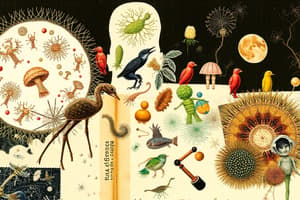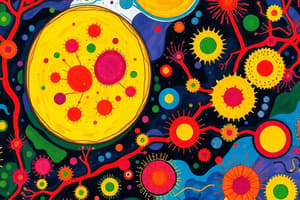Podcast
Questions and Answers
Which virus has a double-stranded DNA genome?
Which virus has a double-stranded DNA genome?
- Poliovirus
- Poxvirus (correct)
- ADIS Virus
- None of the above
What type of RNA does the ADIS virus contain?
What type of RNA does the ADIS virus contain?
- Single-stranded DNA
- Single-stranded RNA, positive-sense (correct)
- Double-stranded DNA
- Single-stranded RNA, negative-sense
Which virus is non-enveloped?
Which virus is non-enveloped?
- Poxvirus
- Poliovirus (correct)
- ADIS Virus
- All of the above
What unique structural feature is associated with the ADIS virus?
What unique structural feature is associated with the ADIS virus?
Which disease is associated with the ADIS virus?
Which disease is associated with the ADIS virus?
What is microbial diversity primarily defined as?
What is microbial diversity primarily defined as?
Which of the following contributes to ecological stability through microbial diversity?
Which of the following contributes to ecological stability through microbial diversity?
What role does the human microbiome play in health?
What role does the human microbiome play in health?
Which of the following is true about the impact of microbial diversity in biotechnology?
Which of the following is true about the impact of microbial diversity in biotechnology?
Which microorganisms are NOT typically included in the definition of microbial diversity?
Which microorganisms are NOT typically included in the definition of microbial diversity?
What is linked to a loss of microbial diversity in humans?
What is linked to a loss of microbial diversity in humans?
Why is quantifying microbial biodiversity different from that of macroorganisms?
Why is quantifying microbial biodiversity different from that of macroorganisms?
Which of the following is NOT a significant role of microorganisms in ecosystems?
Which of the following is NOT a significant role of microorganisms in ecosystems?
What role do microbes play in environmental monitoring?
What role do microbes play in environmental monitoring?
Which of the following classifications was proposed by Carl Woese in the 1980s?
Which of the following classifications was proposed by Carl Woese in the 1980s?
What is the primary molecular basis for distinguishing between Archaea and Bacteria?
What is the primary molecular basis for distinguishing between Archaea and Bacteria?
What makes certain microbes valuable in bioremediation efforts?
What makes certain microbes valuable in bioremediation efforts?
Which family of bacteriophages is characterized by a non-contractile long tail?
Which family of bacteriophages is characterized by a non-contractile long tail?
Which of the following is true regarding Myoviridae bacteriophages?
Which of the following is true regarding Myoviridae bacteriophages?
Which of the following organisms are classified as eukaryotes?
Which of the following organisms are classified as eukaryotes?
Why are viruses considered a separate entity in biological classification?
Why are viruses considered a separate entity in biological classification?
What is the morphology of T7 phage in the Podoviridae family?
What is the morphology of T7 phage in the Podoviridae family?
What insight can studying microbial diversity provide?
What insight can studying microbial diversity provide?
What type of nucleic acid do lambda phages possess?
What type of nucleic acid do lambda phages possess?
Which characteristic is common to all families under the order Caudovirales?
Which characteristic is common to all families under the order Caudovirales?
Which of the following is NOT a category of the three-domain system?
Which of the following is NOT a category of the three-domain system?
How do Siphoviridae bacteriophages attach to bacterial cells?
How do Siphoviridae bacteriophages attach to bacterial cells?
What distinguishes the Podoviridae family from others in the Caudovirales order?
What distinguishes the Podoviridae family from others in the Caudovirales order?
What type of structure does bacteriophage T4 possess?
What type of structure does bacteriophage T4 possess?
Which type of genetic material is found in the Tobacco Mosaic Virus (TMV)?
Which type of genetic material is found in the Tobacco Mosaic Virus (TMV)?
What structural characteristic distinguishes the M13 phage from other types of bacteriophages?
What structural characteristic distinguishes the M13 phage from other types of bacteriophages?
What is the primary method by which M13 phage initiates infection in bacterial cells?
What is the primary method by which M13 phage initiates infection in bacterial cells?
Which virus is known for producing characteristic vesicular skin lesions?
Which virus is known for producing characteristic vesicular skin lesions?
What is the typical size range of a poxvirus genome?
What is the typical size range of a poxvirus genome?
Which of the following statements about the capsid of TMV is correct?
Which of the following statements about the capsid of TMV is correct?
What is a notable feature of poxviruses compared to many other viruses?
What is a notable feature of poxviruses compared to many other viruses?
What is the shape of the Tobacco Mosaic Virus (TMV)?
What is the shape of the Tobacco Mosaic Virus (TMV)?
What character of viruses allows them to harm host cells?
What character of viruses allows them to harm host cells?
Which of the following statements about the nucleic acid in viruses is true?
Which of the following statements about the nucleic acid in viruses is true?
What feature is NOT characteristic of virus structure?
What feature is NOT characteristic of virus structure?
What defines the term 'virion' in the context of viruses?
What defines the term 'virion' in the context of viruses?
Which of the following describes the size range of viruses?
Which of the following describes the size range of viruses?
What type of symmetry can a viral capsid exhibit?
What type of symmetry can a viral capsid exhibit?
What is a common attribute of viruses as compared to bacteria?
What is a common attribute of viruses as compared to bacteria?
What defines the metabolic function of viruses?
What defines the metabolic function of viruses?
Flashcards
Microbial diversity
Microbial diversity
The variety of microorganisms found in different environments, including their genetic variation and metabolic roles.
Microbial diversity study
Microbial diversity study
The study of the variety and relationships of microorganisms.
Ecological importance of microbial diversity
Ecological importance of microbial diversity
Microorganisms are essential for nutrient cycling processes like decomposition, nitrogen fixation, and photosynthesis.
Human microbiome
Human microbiome
Signup and view all the flashcards
Human Health and Microbial Diversity
Human Health and Microbial Diversity
Signup and view all the flashcards
Biotechnology and Microbial Diversity
Biotechnology and Microbial Diversity
Signup and view all the flashcards
Innovation through Microbial Diversity
Innovation through Microbial Diversity
Signup and view all the flashcards
Challenges in quantifying microbial biodiversity
Challenges in quantifying microbial biodiversity
Signup and view all the flashcards
Microbial Communities as Environmental Indicators
Microbial Communities as Environmental Indicators
Signup and view all the flashcards
Bioremediation: Microbes as Clean-up Crews
Bioremediation: Microbes as Clean-up Crews
Signup and view all the flashcards
Microbial Diversity: Tracing Life's Journey
Microbial Diversity: Tracing Life's Journey
Signup and view all the flashcards
Shift From Phenotype to Genotype in Classification
Shift From Phenotype to Genotype in Classification
Signup and view all the flashcards
Woese's Discovery: The Three-Domain System
Woese's Discovery: The Three-Domain System
Signup and view all the flashcards
Archaea: A Separate Domain
Archaea: A Separate Domain
Signup and view all the flashcards
Viruses: Between Life and Non-life
Viruses: Between Life and Non-life
Signup and view all the flashcards
Viruses: Unfit for the Five Kingdoms
Viruses: Unfit for the Five Kingdoms
Signup and view all the flashcards
Viruses: Obligate Intracellular Parasites
Viruses: Obligate Intracellular Parasites
Signup and view all the flashcards
What is a capsid?
What is a capsid?
Signup and view all the flashcards
Viral Nucleic Acid: RNA or DNA?
Viral Nucleic Acid: RNA or DNA?
Signup and view all the flashcards
How big are viruses?
How big are viruses?
Signup and view all the flashcards
What is a virion?
What is a virion?
Signup and view all the flashcards
Viruses: Lack of Metabolism
Viruses: Lack of Metabolism
Signup and view all the flashcards
Viruses: Lack of Cellular Organization
Viruses: Lack of Cellular Organization
Signup and view all the flashcards
Viral Mutations
Viral Mutations
Signup and view all the flashcards
What are Bacteriophages?
What are Bacteriophages?
Signup and view all the flashcards
What is M13 Phage?
What is M13 Phage?
Signup and view all the flashcards
What is Tobacco Mosaic Virus?
What is Tobacco Mosaic Virus?
Signup and view all the flashcards
What are Poxviruses?
What are Poxviruses?
Signup and view all the flashcards
Myoviridae
Myoviridae
Signup and view all the flashcards
Podoviridae
Podoviridae
Signup and view all the flashcards
Siphoviridae
Siphoviridae
Signup and view all the flashcards
Attachment Fibers
Attachment Fibers
Signup and view all the flashcards
Baseplate
Baseplate
Signup and view all the flashcards
Bacteriophage Nucleic Acid
Bacteriophage Nucleic Acid
Signup and view all the flashcards
Lysogeny
Lysogeny
Signup and view all the flashcards
Lytic Cycle
Lytic Cycle
Signup and view all the flashcards
Human Immunodeficiency Virus (HIV)
Human Immunodeficiency Virus (HIV)
Signup and view all the flashcards
Acquired Immunodeficiency Syndrome (AIDS)
Acquired Immunodeficiency Syndrome (AIDS)
Signup and view all the flashcards
Retrovirus
Retrovirus
Signup and view all the flashcards
Reverse Transcriptase
Reverse Transcriptase
Signup and view all the flashcards
gp120
gp120
Signup and view all the flashcards
Study Notes
Microbial Diversity
- Microorganisms existed billions of years before multicellular life
- First observed by Antonie van Leeuwenhoek in the 17th century
- Advanced microscopy, culturing methods, and molecular biology expand understanding of microbial diversity
- Microbial diversity is distinct from macroorganism diversity, due to the immense diversity of microorganisms, their small size, and their clonal nature.
Defining Microbial Diversity
- Microbial diversity encompasses the variety of microorganisms in diverse environments (soil, water, extreme habitats)
- Includes species richness, genetic diversity within species, and the variety of metabolic/ecological roles
- Key microbial groups include: Bacteria, Archaea, Fungi, Protozoa, Algae, and Viruses
Importance of Microbial Diversity
Ecological Stability
- Microbes are vital to biogeochemical cycles (carbon, nitrogen, sulfur)
- Decomposition, nitrogen fixation, and photosynthesis rely on microbial processes
- These processes are essential for life on Earth
Human Health
- The human microbiome consists of trillions of microbes
- Essential for digestion, vitamin production, immune system modulation, and pathogen defense
- Diverse microbiome associated with better health; loss linked to diseases (obesity, allergies, autoimmune disorders)
Biotechnology and Industry
- Microbial diversity is crucial for biotechnological applications
- Microbes are used in antibiotic production, enzyme production, biofuel production, and food fermentation
Environmental Monitoring and Bioremediation
- Microbes are sensitive indicators of environmental change
- Can provide early warnings of pollution and climate change
- Some microbes can degrade pollutants, crucial for bioremediation efforts
Evolutionary Insights
- Microbes are the first life forms on Earth
- Studying their diversity provides insight into the evolutionary history of life and the processes that shaped our planet
- Important for the search for life on other planets
Classification of Organisms
- Until the 1970s, classification was primarily based on physiological differences
- Development of rRNA analysis revolutionized microbial classification
- The three-domain system (Bacteria, Archaea, Eukarya) now categorizes life
- This is based on rRNA phylogenetic analyses (identifying genetic relations)
Viruses
- Considered a separate entity, not part of Whittaker's five-kingdom classification
- Viruses are ultramicroscopic, obligate intracellular parasites for bacteria, plants, and animals
- Viral structure: Nucleic acid (DNA or RNA) surrounded by a protein coat (capsid) or envelope
- Viruses multiply inside host cells, cause diseases, and are inactive outside host cells.
Viral Shapes and Classification
- Classification based on the host they infect (plant, animal, fungal, bacterial)
- Bacteriophages (viruses that infect bacteria) are significantly diverse
- Bacteriophages are structured with a head, tail, tail fibers, and other components
Types of Animal Viruses
- Poxvirus: Causes smallpox; the largest animal viruses, a brick-shaped, nonenveloped, with dsDNA, and complex structure.
- Poliovirus: Causes Polio; the capsid is icosahedral, simple, and ssRNA. Also enveloped.
- HIV: Causes AIDS; single-stranded RNA (ssRNA) virus with an envelope, and complex with reverse transcriptase inside.
Studying That Suits You
Use AI to generate personalized quizzes and flashcards to suit your learning preferences.




